In the industry of rope access technicians, IRATA is the most prestigious certificate attesting their skills. Every year, more and more people come to our centre since the investors they intend to works for require this certificate. Why the IRATA organisation enjoys such confidence? For over 25 years IRATA has been creating safe procedures for rope access works, based on the experience as well as analyses of accidents and near miss incidents. The effectiveness of these procedures is described in the annual IRATA Work and Safety Analysis report. The report for 2015 indicates that there were only 28 accidents during almost 24 million manhours worked in IRATA system (including 1 million IRATA training hours). The statistics encourage employers and trainees, who feel that the money they paid for the training courses were invested well and made them feel safe. If you want to get to know more, visit IRATA website www.irata.org
TARGET GROUP
ABOUT IRATA CERTIFICATE
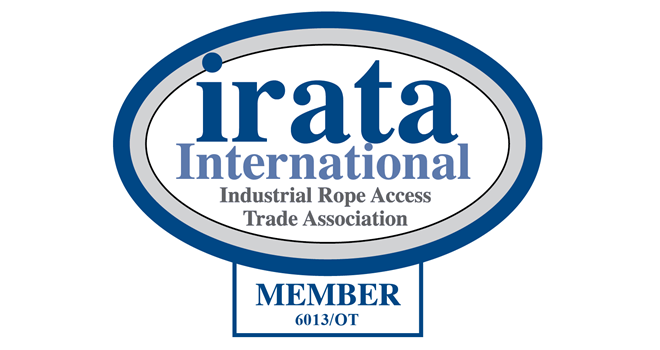
TRAINING CENTREOnly audited and accredited training centres are allowed to conduct IRATA training courses. CSW TOTEM is a recognised and popular IRATA centre in Poland. The location of the centre is also an asset – you can find hotels and hostels nearby. Public transport and rail connection ensure high mobility.
TRAINERSOur IRATA trainers are definitely the best. Two of them earned the title of the Assessor. The other ones appreciate the possibility to teach in a direct way – they are great, incredibly experienced teachers and they contribute to the very high pass rate of IRATA exams.
CERTIFICATEThe IRATA certificate is issued in English, directly by the IRATA office in Great Britain. The trainee receives the certificate, card and logbook via standard Polish mail.
VALIDITY PERIODThe IRATA certificate is valid for 3 years. The expiration date, which is the last day on which the next exam should be taken, is provided on the certificate. If this date expires, the technician loses their license and opportunity to take up the higher-level training.
SYSTEM IRATA
TRAINING AND LEVELS
The IRATA system is divided into three levels, informally called L1, L2, L3. Trainees begin with the first level, which they can refresh or upgrade to the next level. The IRATA training lasts 5 days+1 day for the exam (about 8 hours a day). The assessment is conducted by an external examiner, who arrives to the training centre. Both the training and the assessment consist of the practical and theoretical part. The detailed scope of the training and certification rules are described in the IRATA documents:
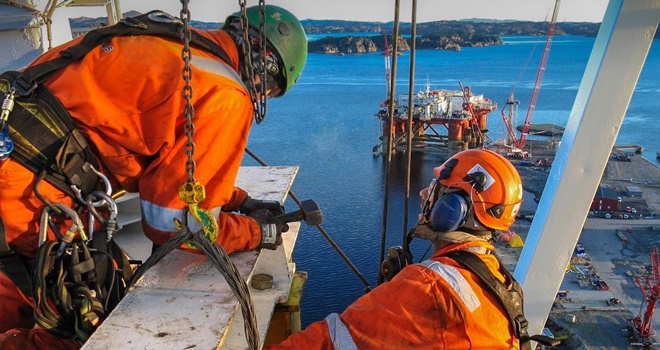
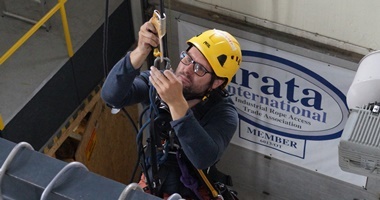
LEVEL 1
ROPE ACCESS TECHNICIAN
At this level, a worker is able to perform rope access operations (vertical and horizontal rope access techniques) individually. The technician has basic knowledge about rigging and rescue operations. According to the IRATA system, they should work under supervision of L3 – refers to the companies with the IRATA accreditation.
At this level, a worker is able to perform rope access operations (vertical and horizontal rope access techniques) individually. The technician has basic knowledge about rigging and rescue operations. According to the IRATA system, they should work under supervision of L3 – refers to the companies with the IRATA accreditation.
REQUIREMENTS:
18 years of age, no medical restrictions for working at height. At the stage of the training, the medical certificate is not obligatory. The trainees sign a declaration that there are no contraindications. The working experience is not required.
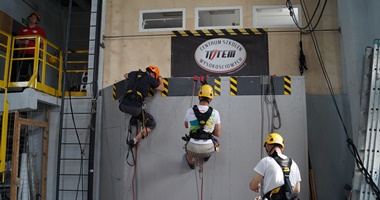
LEVEL 2
ROPE ACCESS TECHNICIAN – SPECIALIST
At this level, a worker has knowledge and skills to perform the full scope of rope access operations. The specialist is capable of rigging and takes part in rescue activities. They have complex knowledge related to the hauling systems and rescue. All tasks are performed under supervision of L3 (refers to the companies with the IRATA accreditation).
At this level, a worker has knowledge and skills to perform the full scope of rope access operations. The specialist is capable of rigging and takes part in rescue activities. They have complex knowledge related to the hauling systems and rescue. All tasks are performed under supervision of L3 (refers to the companies with the IRATA accreditation).
REQUIREMENTS:
Minimum 12 months experience at L1 and 1000 hours logged from the moment of passing the first IRATA assessment (the hours are registered in the logbook received once the first IRATA assessment is passed).
Minimum 12 months experience at L1 and 1000 hours logged from the moment of passing the first IRATA assessment (the hours are registered in the logbook received once the first IRATA assessment is passed).
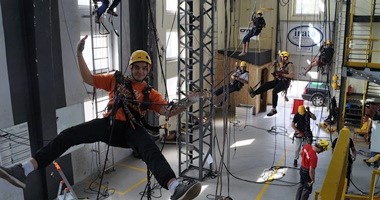
LEVEL 3
ROPE ACCESS TECHNICIAN – SUPERVISOR
At this level, a worker takes full responsibility for the executed works and supervised groups of workers. The supervisor presents full knowledge and skills attributable to the 1st, 2nd and 3rd level. They have complex knowledge about advanced rescue techniques, legislation and the IRATA certification system.
At this level, a worker takes full responsibility for the executed works and supervised groups of workers. The supervisor presents full knowledge and skills attributable to the 1st, 2nd and 3rd level. They have complex knowledge about advanced rescue techniques, legislation and the IRATA certification system.
REQUIREMENTS:
Minimum 12 months of experience at L2 and 1000 hours logged from the moment of passing the L2 IRATA assessment (hours recorded in the logbook). The first aid course will be required to take up work as an L3.
Minimum 12 months of experience at L2 and 1000 hours logged from the moment of passing the L2 IRATA assessment (hours recorded in the logbook). The first aid course will be required to take up work as an L3.
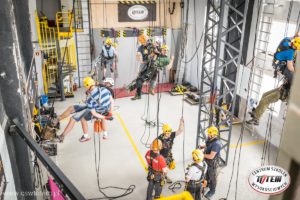
IF YOU DO NOT HAVE MUCH TIME
DIRECT ENTRY LEVEL 2 & 3
System The Direcet Entry(DE) system allows the people with great experience in rope access operations to receive a certificate of the 2nd or 3rd level without the need to pass the lower level examination covered by the standard process. The DE system consists of several steps: preparation of the application confirming the experience / its acceptance by the IRATA office / training / passing the exams. Additionally, a guarantee of employment in the IRATA accredited company is required for DE L3 training. Due to the fact that obtaining such a guarantee is difficult, L2 direct entry is the most popular. The preliminary requirements for DE L2: minimum 1500 hours worked using rope access techniques within at least 18 months of regular work
Documents to download:
Documents to download:




